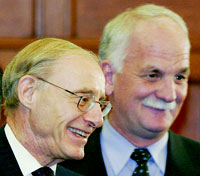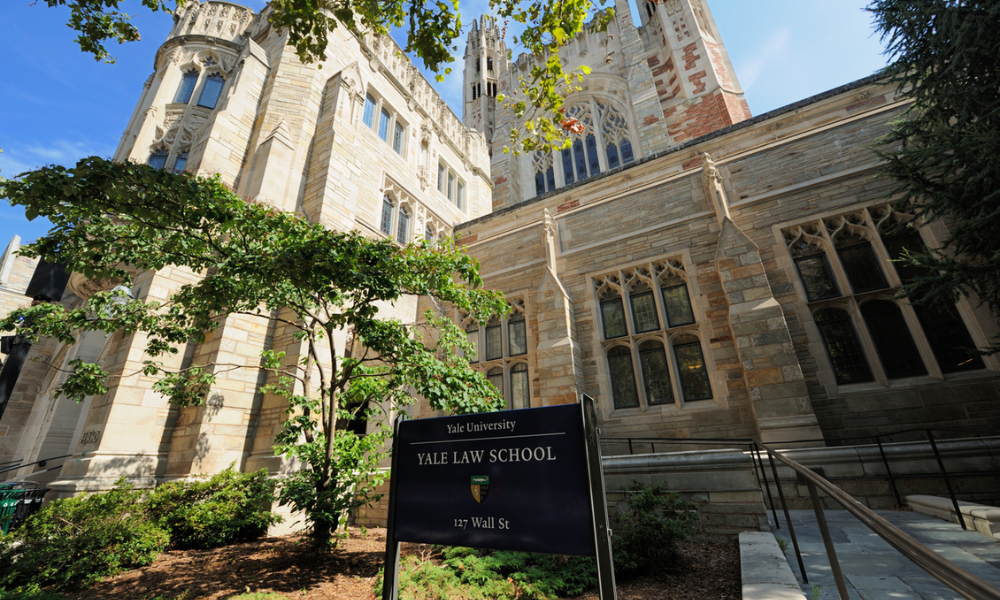Health care legislation, tobacco litigation, securities commission and oil boom are topics of Western conversation.
 Health care legislation, tobacco litigation, securities commission and oil boom are topics of Western conversation.
Health care legislation, tobacco litigation, securities commission and oil boom are topics of Western conversation.
Manitoba’s star is quickly rising within Canada’s legal community under Stephen Harper’s newly elected government. First, former Manitoba Attorney General Vic Toews was appointed Justice Minister in the Conservatives’ Cabinet. He promptly recommended Federal Court of Appeal Judge Marshall Rothstein, Toews’s old University of Manitoba law professor, fill the vacancy on the Supreme Court of Canada.
Based upon his gently extracted comments during his televised nomination hearing, the 65-year-old Justice Rothstein can be expected to act as a check on what critics call the growing judicial activism of Canada’s highest court. Justice Rothstein believes a judge must carefully justify any finding that a law violates the Charter with rigorous analysis, otherwise leaving the setting of social policy to the government.
“The important thing is that judges, when applying the Charter, have to have recognition that the statute that they’re dealing with was passed by a democratically elected legislature √¢‚ÃÆ’‡Â¨Â¬Â¶ and therefore, they have to approach the matter with some restraint,” he declared.
Justice Rothstein’s case law legacy to date includes his 1999 ruling in Collins v. Canada (T.D.), in which he found that although Canada’s Old Age Security Act discriminated against separated spouses, Parliament was entitled to limit payments for valid policy or financial reasons. His most talked-about decision, however, was his 2002 ruling in which he allowed a patent to be placed on a genetically engineered mouse. (His ruling acknowledged Parliament had the jurisdiction to set policy in this regard.) The Supreme Court of Canada later overturned his ruling.
Still, Justice Rothstein’s nomination defies branding as a political appointment. While picked by the Conservatives, Justice Rothstein was among three highly qualified candidates on a short list compiled by an advisory panel appointed by former Liberal justice minister Irwin Cotler. The other nominees were Peter MacKinnon, the president of the University of Saskatchewan, and Constance Hunt, Alberta Court of Appeal.
As for the retiring John Major, he’s rejoined the Calgary office of Bennett Jones LLP, where he practised for
34 years before his 1991 appointment to the Alberta Court of Appeal, and then the Supreme Court of Canada the following year. As of April 1, Major was also appointed a member of the Alberta Securities Commission, along with Beverly Brennan, Allan Edgeworth, Neil Murphy and Karen Prentice.
Another western lawyer winning a vote of confidence from the new government is Calgary’s Jim Prentice. As Canada’s new Minister of Indian Affairs and Northern Development, Prentice will help oversee the
government’s decision whether to uphold the 28-year-old Northern Pipeline Act, which grants TransCanada Corp. the right to build the Canadian leg of the Alaska Pipeline project, or place the project under the direction
of the National Energy Board, opening the competition to rivals.
As well, Prentice’s office will be faced with the continuing headache of managing threatened litigation from aboriginal groups, which say they haven’t been adequately consulted in the process.
As Greg McDade, managing partner of Vancouver’s Ratcliff & Company LLP and lawyer for the aggrieved Carrier Sekani Tribal Council, puts it: “We’re in the new world of aboriginal empowerment. And the National Energy Board hasn’t caught up.” The Council, which requested a voice in the recommendation of a joint review panel of the NEB in January, represents First Nations groups whose land covers about one-third of the proposed pipeline route in B.C.
In other western Canada litigation news, Manitoba became the latest province to introduce legislation enabling the government to sue tobacco companies to recover smoking-related health care costs. In a cross-country domino effect set in play by September’s Supreme Court of Canada ruling that B.C.’s Tobacco Damages and Health Care Costs Recovery Act is constitutional, Nova Scotia, Newfoundland and New Brunswick have also introduced similar legislation. Tobacco companies are warning the actions could bankrupt them.
As for Toews, Canada’s legal community can expect him to get tough on crime with promises to levy a four-year minimum sentence on drug and firearms crimes and plans to raise the age of consent from 14 to 16, with a “close-in-age exemption” to guard against prosecutions of teenaged lovers. As seen with Rothstein’s public nomination hearing, Toews has already begun to deliver on his promise to make the Supreme Court of Canada’s appointment system more transparent.
Other provincial legislation shaking up the status quo is Premier Ralph Klein’s proposed Alberta Health Care Assurance Act, which would override the Canada Health Act. The draft legislation seemingly would allow the development of a two-tier public and private medical system and for-profit hospitals operated by foreign corporations, as it drops two critical elements of the “Protection of Publicly Funded Health Care” section of Bill 11 — the banning of private hospitals in Alberta and a prohibition of queue jumping and uninsured surgical services.
The law is perhaps a logical legal extension of the Supreme Court’s 2005 Chaoulli v. Quebec (Attorney General) ruling, which held the ban on private health insurance violates both the Quebec and Canadian Charters and is not justified under section 9.1 of the Quebec Charter or section 1 of the Canadian Charter. Watch for other provinces to follow suit.
In British Columbia, meanwhile, litigation risk may no longer mean saying, “I’m sorry.” In late March, B.C. Attorney General Wally Oppal adopted the private member’s bill first proposed by Liberal MLA Lorne Mayencroft, introducing Canada’s first so-called “Apology Act,” making an apology inadmissible as evidence of liability. Since the opposition also supports the bill, it is expected to come into force quickly.
As well, the western provinces continue to shun Ontario’s proposed national securities commission in favour of an alternative passport system. It would harmonize the rules enforced by Canada’s 13 provincial and territorial commissions, but allow individual jurisdictions to retain regulatory control. In February, Oppal announced that his province had decided to drop its plans to unilaterally overhaul securities legislation in favour of the harmonized approach endorsed by most provinces.
“It is now clear that the provincial-territorial agreement offers the best way for Canada to improve protection for investors and reduce regulatory burden on the securities markets,” says Oppal. According to Calgary lawyer Bill Rice, recently appointed chairman of the Alberta Securities Commission, western resistance to a national securities commission is rooted in concerns that Toronto would seek to control it.
Clearly, Bay Street has yet to learn that not everyone considers Toronto to be the centre of Canada’s legal universe. In Calgary’s super-heated legal market, top-billing lawyers are quickly gaining on the $800 rate now commanded by Bay Street’s elite, charging upwards of $500 to $600 an hour.
“Calgary is now a very confident and busy and happening place,” says Hugh MacKinnon, national managing partner of Bennett Jones, who frequently travels between the Toronto and Calgary offices and denies media reports his firm plans to merge with Vancouver’s Farris, Vaughan, Wills & Murphy LLP.
Both MacKinnon and Tris Mallett, managing partner of Osler, Hoskin & Harcourt LLP’s Calgary office, also play down media reports of a frenzied “talent war” in which the Calgary office has hired away BJ stars Bob Lehodey, a top biller, leading energy practitioner Rob Desbarats, takeover guru Noralee Bradley, pensions lawyer Chris Brown and three of his associates. Osler’s has added 10 to 12 lawyers in specially targeted practice areas in a “trickle” of hirings over the past two years, says Mallett, adding the Calgary office is now “pushing 50.”
MacKinnon, whose firm reportedly enjoyed its most profitable year ever last year, notes the province’s vibrant economy is promoting the increased specialization of lawyers into securities law and M&A in his firm’s Calgary
and Edmonton offices. “You need a diet of good work and they’re getting it.” However, MacKinnon says lawyers are not seeing as much financing work as you’d expect, since the oil and gas industry is so rife with cash. “Alberta obviously is booming with a very strong economy. For the legal services, it’s been very strong. It’s not crazy.”
Still lawyers expect the legal market in Calgary to stay healthy, regardless of whether oil stays high in price, due to long-term commitments to develop the oil sands projects in Alberta. Says Mallett: “The Calgary market is not structurally the same as it was five or 10 years ago, when the economy was dependent on the price of oil.”
While the booming oil and gas industry has brought growing affluence to lawyers, however, it has also brought headaches galore in the form of a growing number of client conflicts. With so many new oil and gas start-ups — many by the same serial entrepreneurs — coming to market, with exit strategies that include takeovers and mergers with other firms, Calgary law firms may face the most conflict-ridden client base in the country, say lawyers.
In fact, client conflict issues, with some partners reportedly throwing their weight around behind the scenes to skewer other lawyers’ relationships with their clients to pursue their own files, was reportedly behind the exodus of some lawyers from Bennett Jones. Asked about reports that the firm’s executive committee’s investigation — dubbed internally the “Royal Commission of Inquiry” — had led to lawyers leaving Bennett Jones, MacKinnon responds: “What’s been said has been said."
“The firm is very rigorous in terms of defending client-first and firm-first behaviour. Because we’re the dominant player in Alberta, we’ve had to be very careful,” he says. “Nobody got killed here either. I don’t want to overstate it.”










